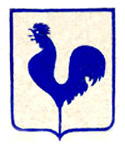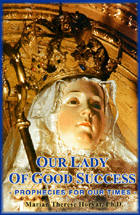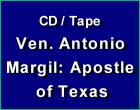Stories & Legends
 |
 |
 |
 |
 |
 |
 |
The First Victory of Bertrand du Guesclin
Bertrand du Guesclin (c. 1320–1380) was born in the Castle of la Motte-Broons (near Dinan) into a noble Breton family. Because of his bravery and shrewd tactical sense he became one of the most celebrated knights of the Hundred Years War. He fought for his longtime friend and patron, King Charles V of France, who named him Constable of France, a position he held from 1370 to his death.The chronicle by Cuvelheir tells us that Bertrand du Guesclin was the first born son of Robert du Guesclin and Jeanne du Malmains of Sens.
He was known as the Eagle of Brittany or the Black Dog of Brocéliande. His famous cry entering the battle was “Notre Dame, Guesclin!”
Chroniclers extolled his martial talents, manuscript illuminators drew pictures of his successes, and a poet wrote an epic poem about him. For this reason, du Guesclin remains the embodiment of the chivalrous knight of the era of the Hundred Years' War.
This is the story of how the young Guesclin began his military career.
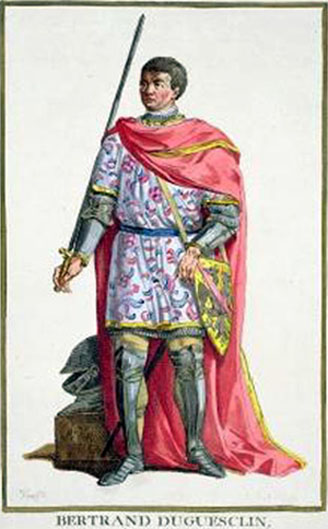
An incident that had marked influence upon his career occurred in 1337, when he was in his 18th year. The marriage of the children of local nobles led to festivities in many parts of Brittany in honor of the event.
One of these gatherings occurred at Rennes. Among its important features was a tournament by a number of the assembled chevaliers and squires. Bertrand, who was there with his uncle, attended the fete mounted on one of the work horses belonging to his father, disheartened to appear in such poor form and bear the contemptuous remarks of bystanders.
On arriving at the lists, which were erected in the marketplace, he saw the chevaliers and squires who were clad in shining armor and mounted upon spirited war-horses.
"Alas! " he exclaimed, "If I but had a good horse! Were I only armed as a gentleman should be, I would attack the best mounted and would overthrow them, or I would perish in the attempt! My father has done me a great wrong; he has not given me the position which belongs to the son of a chevalier. But, if I am destined to outlive him, I swear that I will acquire more glory than Roland, Arthur, and Gavain, even if I be compelled to spend my entire inheritance to achieve it!"
Meanwhile, the sound of the trumpets announced the commencement of the tournament. Robert du Guesclin, his father, was taking part in these jousts. But Bertrand's attention was turned toward one of his cousins, the same age as himself who was clad in a fine suit of armor, and mounted upon a powerful warhorse.
After he had run the number of courses fixed by the rules of the tournament, Bertrand went to him and begged him to lend him his armor and his horse. "Indeed, Cousin Bertrand," he replied, "I will do so with pleasure, and will arm you myself."

Betrand lifts his visor and reveals his identity to his father and the crowd
"Behold a valiant squire!” exclaimed the heralds. But they could not give his name as he kept his visor down.
When the discomfited chevalier regained consciousness he demanded the name of his conqueror. His attendant soon returned with this reply: “Sire, you will learn the name of this squire when he is unhelmeted by you or another, and then only will you know it."
The skillful and fortunate thrust of the young squire, and the mystery which surrounded him, provoked the bravest of the champions to combat with him. But they met with no better success than the first, for Bertrand put them, one after another, hors de combat.
It now came the turn of Robert du Guesclin, who had, thus far, held the field against all comers. On riding to meet him, Bertrand recognized the arms upon his shield as those of his father, and, lowering the point of his lance courteously, he passed him and returned to his position.
He was at once challenged by another chevalier, who thought his action had been prompted by fear. Attacking him, Bertrand, with a well-directed thrust of his lance, sent his helmet to a distance of ten paces, and again the heralds cried, "Victory for the adventurous new-comer!"
Bertrand ran 15 courses successfully when, in the 16th, he was unhelmeted by a Norman chevalier of great skill. Then Bertrand’s visor was lowered and he was recognized by his friends. The prize of valor was awarded to him, and he returned from the festival in triumph.
The delight of his father was great, and he immediately promised him all he might ask of horses and of money. His mother, also, joined in the rejoicing, and, from that time, his position was entirely changed.
This then was the opening event of a memorable career.
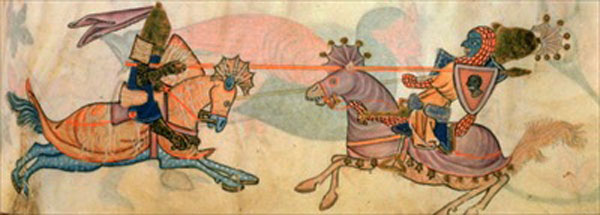

Adapted from Betrand du guesclin, Constable of France,
NY/London: GP Putnam’s Sons, 1897, Chapter 1
Posted June 22, 2013
NY/London: GP Putnam’s Sons, 1897, Chapter 1
Posted June 22, 2013
